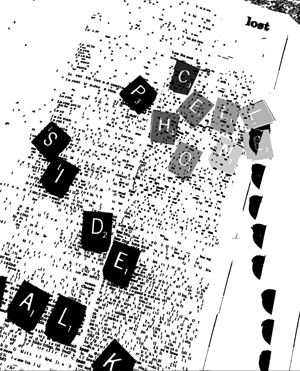I think it is strong for anyone dealing with Alzheimer's as well. Let me know what you think.
The Way We Speak Now
by Angi Becker Stevens
 art by Gay Degani |
Some people have had the idea to try to come up with replacements, but the new words just won't stick, as if this is not really a matter of words abandoning us, but of things that refuse to be named.
At some point we lost track of how many words have gone. There's no doubt anymore whether they have been vanishing from dictionaries as well—dictionaries are getting thinner. Other books are not getting thinner, but are merely developing empty spaces. I wonder how long it will be before they are filled with blank pages, every last one turned into a sketch pad, or a journal if there's anything left to write.
So far, we have managed to adapt. There are ways to describe almost anything. Sometimes I think about this game we used to play when I was a kid, where you tried to make your teammates guess a word without using a certain list of closely related words, like you would not be able to use the word "orange" if you were trying to make someone guess "carrot." When we lost the word for the color of the sky, I thought about how maybe playing that game was good practice. I can't remember the name of the game, but I don't think it's a vanished word. I think it's something I just forgot on my own.
The words that are gone are like hundreds of tiny phantom limbs. They feel constantly like they are on the tip of my tongue. The sensation reminds me of the way I felt during the final few months my lover and I spent together, like I always had a mouthful of words I could not form the right shape for no matter how many ways I tried to arrange my lips and my tongue and my teeth. It was like waking up on the very edge of remembering a dream, that feeling of being so goddamn close to something but still so far away it was useless, might as well have been on the other side of the universe.
Sometimes I wonder how many words have disappeared that I have not even noticed because they are words I seldom ever use. It would probably take me a long time to realize, for example, if "horticulture" or "uvula" or "bismuth" went away. Every once in a while I flip through the dictionary, just to remind myself of how much is still left.
The way we speak now: like we are always trying to explain things to visitors here who barely speak our language. We say: the clear smooth stuff that you look through to see outside if you are indoors. We say: the box with the moving pictures on it that we watch to forget real life. We say: the buildings we live in. The animals with feathers that can usually fly but sometimes cannot. The specific injury when you touch something too hot or stay too long in the sun. Sometimes I think it sounds like a kind of poetry, and other times I just think we all sound simple-minded and slow. We are all like visitors here now.
It didn't bother me when we lost the word for the metal things we ride in to get from one place to the next. But I cried when I realized we'd lost the name for the tiny dots of light you can see up in the sky in the nighttime. I can't explain why, but that was the only word I really mourned, a loss that ached like a small death.
I think about how my lover and I were always trying to find more words, as if language was the thing that could put us back together again. But maybe what we needed all along was to say less. When I think of him now, what I remember is not anything he ever said. I remember breathing into his neck, and the way I would slide my arms up inside of his jacket not for warmth but because I could never figure out how to feel close enough to him. What I felt was always a wanting—I wanted him even when I was with him, a longing lodged squarely beneath my breastbone, inside some dull-thumping muscle I used to have a name for. And I wonder sometimes what would happen now if I called him and said nothing at all, if it's possible somehow for the mere sound of my breath to release all those ghosts of words trapped inside my throat, to tell him all the things that have become unspeakable.
"http://www.smokelong.com/flash/angibeckerstevens31.asp
All content in SmokeLong Quarterly copyright 2003-2011 by its authors.
Angi Becker Stevens' stories have appeared in a variety of publications, including The Collagist, Pank, Monkeybicycle, Wigleaf, and Best of the Web 2010. She lives in Michigan and has one daughter, two partners, and a small assortment of oddly-sized pets.
Nominated for a Pushcart, Gay Degani has published in journals, anthologies, and her own collection, Pomegranate Stories. A list of her online writing can be found at Words in Place. Her artwork has been featured at Faraway Journal, 3 A.M, and Smokelong Quarterly. She’s a staff editor at SmokeLong and managing editor of EDF’s Flash Fiction Chronicles.
What a poignant and powerful piece of writing. And how synchronistic. After I wrote my blog about dictionaries, I came here to visit your blog. I guess we travel on the same wavelengths though it will be a long time and many experiences before I can write with the same kind of reverie and longing as Stevens.
ReplyDelete